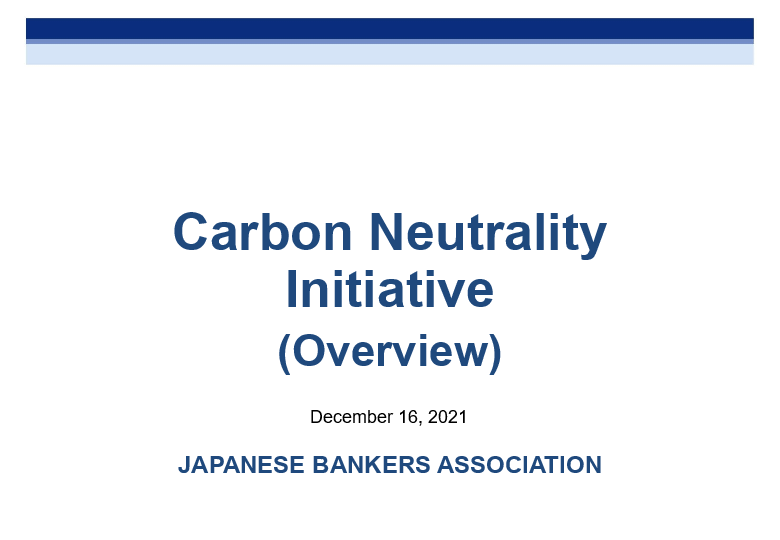
Carbon Neutrality Initiative (Overview) [429 KB]
Dec.16.2021
Japanese Bankers Association
The Japanese Bankers Association (Chairman: TAKASHIMA Makoto, CEO of Sumitomo Mitsui Banking Corporation) is pleased to announce that it has set out the JBA’s initiatives to achieve carbon neutrality (hereafter, “Carbon Neutrality Initiative”).
In October 2020, the Japanese government declared its pledge to achieve carbon neutrality by 2050 and in April 2021 set its interim target to reduce GHG emissions by 46% from the FY2013 levels by FY2030. In response to the commitments, a number of projects for carbon neutrality are currently being carried out in both public and private sectors in Japan.
At COP26 held in November 2021, global leaders reaffirmed their intent to pursue efforts to limit the temperature increase to 1.5°C in accordance with the Paris Agreement, and agreed to invite further actions over the next 10 years to 2030 (which is being called a “critical decade”), taking into account IPCC’s Sixth Assessment Report(※1).
The JBA believes that it is also an urgent and critical issue for the Japanese banking industry to work on reducing its own GHG emissions and to provide financial support to the economy to achieve a “Just Transition”(※2) to carbon neutrality / net zero emissions. There is also increasing international pressure on financial institutions to manage climate-related financial risks, including physical and transition risks that impact their portfolio. Supporting clients' efforts toward carbon neutrality / net zero emissions is crucial for banks from the viewpoint of not only dealing with climate-related financial risks but also maintaining the international competitiveness of the Japanese economy.
Against this backdrop, the JBA set out the “Carbon Neutrality Initiative”, which identifies the JBA’s key policies and priorities up to 2030 to further strengthen the efforts of the Japanese banking industry toward achieving carbon neutrality.
Based on this Initiative, the JBA is committed to playing an important role to achieve carbon neutrality / net zero emissions by 2050, working with its member banks, industrial sectors and the public sector.
For this Initiative, the JBA carried out interviews with key stakeholders including its member banks, companies in hard-to-abate sectors, leading companies actively working toward carbon neutrality and regional companies.
Appendix 1: Carbon Neutrality Initiative(Overview)
Appendix 2: Carbon Neutrality Initiative(Full)
(※1) The Sixth Assessment Report of the Intergovernmental Panel on Climate Change (IPCC), published in August 2021, pointed out that “it is unequivocal that human influence has warmed the atmosphere, ocean and land” and “global warming of 1.5°C and 2°C will be exceeded during the 21st century unless deep reductions in carbon dioxide (CO2)and other greenhouse gas emissions occur in the coming decades”.
(※2) According to the ICMA, a “Just Transition” is defined as a transition that “seeks to ensure that the substantial benefits of a green economy transition are shared widely, while also supporting those who stand to lose economically – be they countries, regions, industries, communities, workers or consumers”. The Just Transition concept links to the United Nations’ Sustainable Development Goals (SDGs).